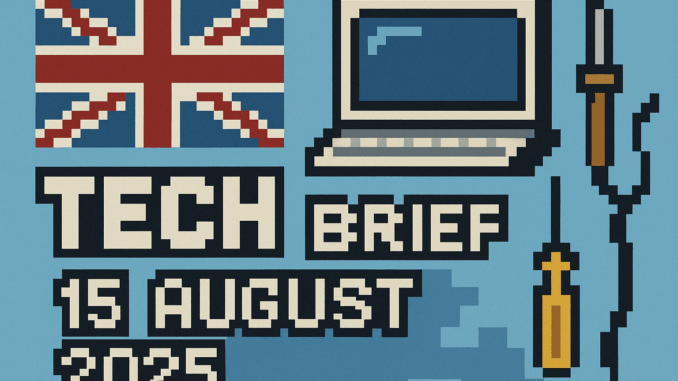
Tech Brief 15 August 2025 brings sharp changes to Britain’s digital landscape, from age checks on adult sites to a record share of girls in A-level computing and a government splash of cash for device repair. Whether you are restoring a BBC Micro or debating the virtues of Bondi Blue, these stories matter. Missed yesterday’s Tech Brief? Catch up here before diving in.
Porn Site Traffic in UK Plummets After Age Verification Rules
“Seventy percent drop overnight.” That is the blunt assessment from one of Britain’s largest content filtering providers after the new Online Safety Act forced strict online age checks. Pornhub visits are reportedly down by nearly half, with similar declines across other major sites. For regulators, this is proof that intervention can bite quickly.
Past attempts at digital regulation in the UK have ranged from light-touch guidelines to outright site blocks, fuelling playground rumours about secret backdoors and clever workarounds. This time, the sheer scale has everyone talking. Internet providers, legal experts, and even hobbyist sysadmins are combing through the technical details for loopholes. Supporters say it protects young users, while critics warn about privacy and heavy-handedness.
The debate is not going anywhere. Controls change, but the cat, mouse game between policy and technical ingenuity is as lively as ever. Will this round hold, or is a new workaround already brewing?
Girls’ Share of A-Level Computing Rises as Overall Numbers Fall
This year, more girls than ever sat A-level computing in the UK, even as total entries slipped. For anyone who remembers eighties computer labs with a single girl at the back of the room, this is quietly radical.
The numbers are not earth-shattering, but the trend is real. Teachers credit digital clubs and coding competitions for sparking interest, sometimes with a boost from second-hand hardware. One examiner mentioned classroom projects using BBC Micros and Raspberry Pis side by side, letting students bridge decades in a single lesson.
Policy makers are watching closely. Sophie Wilson, who helped design the original ARM processor, is cited as a role model. Change is slow, but the club is opening up, one project at a time.
Government Backs Device Donation and Repair with £9.5m
Could a handful of grassroots repair nights influence official spending? This week, the UK government pledged £9.5 million to support device donation schemes and volunteer-led tech workshops. The funding aims to help low-income families and older people, with a focus on recycling and repair.
For anyone active in hackspaces or repair cafés, this is old news. Community groups have patched up ThinkPads, revived battered smartphones, and run “tech help” days in drafty village halls for years. Now, the government is scaling up these efforts, but can policy ever match the patience and oddball ingenuity of local volunteers?
The answer might arrive with the next donated laptop and a box of mismatched power adapters.
Nothing Headphone 1 Blends Walkman Vibes with Modern Tech
Physical buttons, transparent shells, and a design that would not look out of place on the cover of an old games magazine. The Nothing Headphone 1 is not shy about its retro roots.
Reviewers point to the industrial curves and see-through casing, which call to mind both classic Sony Walkmans and a hint of Doctor Who’s Cybermen. Underneath, there is a battery that lasts, proper Bluetooth range, and active noise cancelling that actually works. What stands out for hardware fans is the unapologetic display of the device’s internal workings. No more hiding the mechanics.
It is a rare moment of personality in a market obsessed with black rectangles. The last time hardware made this much of a statement, the Bondi Blue iMac was still a punchline in the staffroom.
From the Wayback Machine
On This Day: 1998 – Apple launched the iMac G3 in Bondi Blue, with a 233 MHz PowerPC G3 chip and only USB ports. Critics mocked its missing floppy drive, but nearly 800,000 units sold in five months. For many, it was the first computer that felt like a design object, not just a beige box.
Today’s Big Question
Tech Brief 15 August 2025 leaves a question hanging. Do new regulations, shifting classroom demographics, or see-through headphones matter if we lose the hands-on spirit that made tech memorable? Is personality in hardware making a comeback, or are most devices destined for sameness?
Stay curious, keep your soldering iron handy, and never underestimate the power of a second-hand BBC Micro.
Missed yesterday’s Tech Brief? Catch up here

Leave a Reply